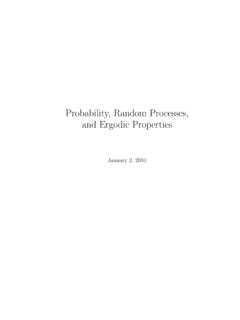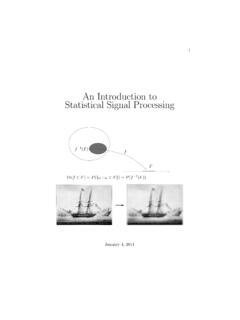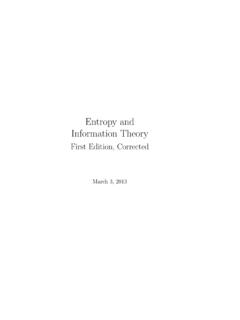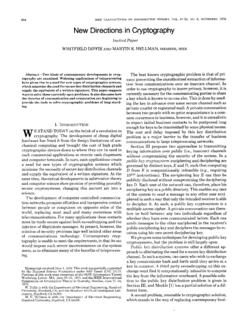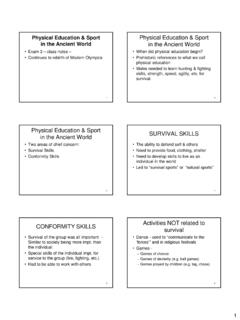Transcription of Realism and Morality in Politics - Stanford EE
1 1 Realism and Morality in PoliticsAndrei V. KortunovInstitute of USA and Canada Studies, Academy of Sciences of USSR. is author of chapters in eight books and more than thirty papers andcoauthor of the book American Model on the Scales of good in thinking this is the main principle of Morality . Blaise PascalRealism has always been considered an important virtue for a stateleader. Understandably, a reputation of a dreamer, or even worse of anunrestrained adventurer, would not win anyone s support. It is particularlyunsuitable for any man responsible for the destiny of a Realism in Politics takes on special significance. The time ofprophets and magicians has passed. The continued existence of life on thisplanet depends on the direct and consistent application of realisticprinciples to international and practices of original realists in foreign policy, NiccoloMachiavelli and Hugo Grotius, or the Realpolitik of Austrian PrinceMetternich are again achieving popularity in the modern world.
2 This isunderstandable, since no one wants to run the risk of embarking on a totallyunknown path in Politics , particularly when the stakes are high. Under theseconditions, the future is predicted by a straight line extrapolation from thepast. Present actions are then not determined by what might be, but by whathas already happened or is happening at the / Global ThinkingYet this kind of attachment to the past correlates very poorly with the realworld. If this type of Realism had been followed in science, in the arts, or insociety in general, then civilization would have stagnated. Copernicus sconcepts of orbital mechanics in astronomy cannot be logically deducedfrom Ptolemy s. Descartes s reasoning concerning the physical laws ofnature cannot be extrapolated from Aristotle s thoughts. Nor can Einstein sobservations of the laws of the universe be regarded as a directconsequence of Newton s.
3 In a similar way Gauguin s paintings are not amodern day adaptation of Raphael s techniques, and Christ s teachings arenot a direct result of the system developed by the ancient in Politics and dogma were never meant to be identical. Politicalrealism, when practiced properly, first stood for an objective analysis of theexisting political problem; then for the choice of the central or principlemeans for its solution; and finally, for a realistic estimate of the possibilitiesfor achieving this aim and its subsequent means that the practice of Realism can never be set in concrete. It hasto be flexible and change with the character of political life and facts ofhistory. What was good yesterday may be totally useless today. Today,what is accepted without question may appear senseless s success may lead to disaster, if used in the near a change of habitual patterns is often difficult, whether it involves thehard sciences or patterns of social life.
4 In Politics it is probably even moredifficult. The applicability of a theory or practice in science can be demon-strated by performing an objective experiment. Findings can be comparedafter a series of observations and errors are evaluated. The opposite is truefor the politician history gives him only a single chance. The failure of asocial experiment usually is not only a personal catastrophe for theindividual politician, but of the basic concept he was fighting for, as the other hand, certain things are easier for politicians. Politiciansdon t need to spend nights in a laboratory or watch blips on a screen of anoscilloscope, pore over notes of previous experiments or depend on newinsights from repeated statistical analysis of their data. The only thingusually needed is an alertness to the constantly asked question: Are wetrying to introduce Newtonian Politics into an Einsteinian world thathas completely changed its manner of operation?
5 The world is constantly changing. Today the rate of that change hasbecome so rapid as to require development of new approaches anddecisions which are consistent with the times. Though it will not bepossible to cover all events fully, it is possible to detail some of thephenomena which have become driving forces for new approaches inrealism in foreign and Morality in Politics / 3 The World Is Striving for Diversity. It was never true that one couldimagine various countries as identical billiard balls that were colliding withone another on the world political scene. Yet it is true that those countrieswhich determined the nineteenth century s classical balance of power had much in common. They were united by a similar socioeconomic base,a common past (European), a common culture (Age of Enlightenment),and a common religion (Christianity).
6 The ruling elites, whether inPetersburg or Madrid, also had a common language (French).The situation is quite different today. The past few decades have failed toconfirm predictions that the world is moving in a direction of greaterstandardization and unification and that modern -day economics andattendant political relations would wipe out historical modes of interactions,nationalism, cultural differences, and ideologies. Instead, it has becomeclear that with a certain level of social development, humanity can afford tochoose different life-styles and approaches on the world scene. This in turnmeans the days of messianic universal dogmas and ideologic crusades arecompletely a thing of the past. The past few decades have failed to confirm predictionsthat the world is moving in a direction of greater stan-dardization and unification.
7 The days of messianicuniversal dogmas and ideological crusades are completely athing of the past. Diversity denotes not only differences in function, but of interest, as it is this diversity that is the source of greater stability of theoverall system. For example, in a forest each tree, bush, or blade of grasshas its own unique spot and competition takes place among its own kindrather than with others. This principle also applies in the international arenawhere differences among countries may not sharpen competition. Instead itmay enhance possibilities for cooperation. Take, for example, the presentstate of economic cooperation between the East and the West. Its develop-ment has enormous possibilities. For the most part this is due to structuraldifferences in the systems and related growth potential between socialismand capitalism. As a result, economies of East and West do not actuallycontradict one another, but rather mutually supplement each other; forexample, present progress in space sciences.
8 The USSR has placedemphasis on the development of a space station, while the US has empha-sized development of the space / Global ThinkingOver the Years International Relations Are Becoming More of world Politics to bipolar or multipolar concepts is notonly an oversimplification, it is a delusion. Contrary to the recent pastwhere at most a dozen states dealt with the rest of the world in a classicbalance of power posture, there are now two hundred that can and do act inthis manner. Thus balance of power in the modern world must be based ona newer and more useful long-term model. World Politics under theseconditions must be an open rather than the closed system of the past. Notonly must nation-states be included in this process, but internationalorganizations, transnational business groups, means for internationaldialogue, political and public movements, as well.
9 The former hierarchy offoreign-policy priorities is also losing its clear lines of distinction. Newproblems are appearing on the world community s agenda. To analyze theevents and trends of today through the prism of old-style political Realism is like trying to pour water from a pail into a bottle with a narrow neck. Ofcourse some water will get into the bottle, but the loss will be Interdependence of Nations. The chain of interdependence doesnot consist of just one or two links: Therefore, economic decisions taken inone part of the world can have significant unforeseen consequences at othersites, near or remote. In the past when interactions were chiefly politicaland military, a high degree of economic independence was present. Foreigntrade was totally dependent on Politics and was only a minor aspect of anycountry s overall economic structure. Today the reverse is true.
10 Theinternationalization of world economic ties has reached such a high degreeof interdependence that any steps to undermine trade brings enormoushardships to all participants, even those not directly associated with thechanges. This is particularly the case for most middle- and small-sizednations who regularly have over half of their gross national product tied toexporting goods. The notion of national power takes on new meaningunder these conditions and is relative to a great number of variables,including the extent of foreign-policy agreements, the amount of capitalinvested outside the country, and the amount of business conducted with orin a specific country. In some cases these may be assets for foreign policy,in others they may become a source of significant vulnerability. Forexample, while a creditor can exert tremendous pressure on a debtor, it canalso become a hostage of the debtor between Foreign and Domestic Policies Are Fading.
